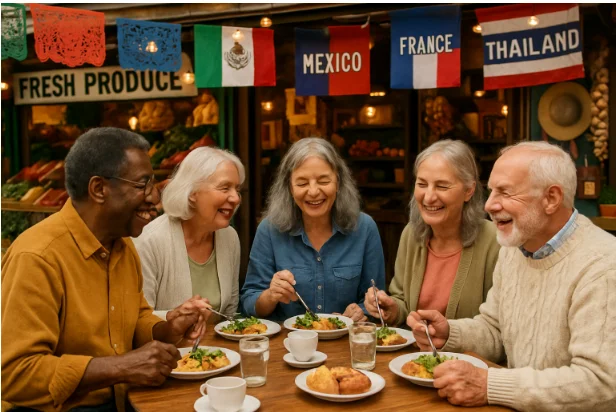The Connection Between Food, Travel, and Aging Well
Food and travel have long been associated with pleasure and discovery, but they also hold untapped potential to support healthy, positive aging. Engaging with new cuisines and cultures opens doors to social connections, increased cognitive stimulation, and improved nutrition in later life.
Learning to appreciate different flavors, cooking techniques, and traditions does more than tantalize taste buds; it fosters inclusion, cultural awareness, and emotional fulfillment. As older adults interact with global or community food traditions while traveling, they develop lasting memories and reinforce bonds with friends old and new.
Travel as a Gateway to Cultural and Culinary Discovery
Travel offers older adults adventure and connection through shared experiences like tasting Italian pasta in Rome or sampling tagine in Marrakech, fostering joy, learning, and engagement. Culinary tourism—cooking classes and farm tours—creates community worldwide. Local markets and festivals give seniors authentic opportunities to explore ingredients and techniques, broadening perspectives and palates. As Claudette Spinelli Schwartz notes, participating in local food activities helps seniors build networks, friendships, and curiosity. Lifelong learning—key to healthy aging—is promoted when they try new recipes or dine with new companions.
How Cooking Traditions Strengthen Intergenerational Bonds
Food connects generations, with family travel offering chances to revive cherished recipes and rituals. Preparing traditional dishes sparks stories, fosters continuity, and passes skills and values from grandparents to grandchildren. These moments strengthen bonds, enhance communication, and reduce isolation. Families cooking and eating together report better relationships and well-being among older members.
Nutrition on the Road: Smart Choices for Senior Travelers
Maintaining nutrition while traveling is vital for older adults. Research local dining options and pack healthy snacks to manage dietary needs. Emphasize fresh, seasonal produce and water intake for simple, effective nutrition. Consult healthcare providers before traveling to discuss dietary needs. The CDC offers practical tips for meal planning and adapting to different schedules or recipes abroad. Flexibility and planning help ensure healthy eating without sacrificing enjoyment.
Finding Community Through Food-Focused Travel
Connecting with others over food is one of the most rewarding aspects of travel. Group dining experiences, guided food tours, and communal cooking classes allow older travelers to mingle with locals and fellow visitors. Participation in these activities is linked to reduced rates of depression and increased overall satisfaction. These shared experiences often blossom into lasting friendships and enrich cultural understanding.
Local community centers and travel clubs frequently offer accessible opportunities for group culinary activities, ensuring that even travelers with limited mobility or experience can participate safely and comfortably.
Staying Safe While Exploring New Flavors
Safety is paramount for senior travelers, especially when trying unfamiliar foods in new environments. Prioritizing reputable establishments, practicing proper hygiene (such as washing fruits and vegetables), and being mindful of food allergies is essential. Travel insurance that includes healthcare coverage and ready access to medical facilities can also help prevent small misadventures from becoming emergencies.
Listening to the body’s signals and making adjustments as needed helps ensure trips remain enjoyable rather than overwhelming, particularly for travelers managing chronic health conditions.
Learning From Global Blue Zones
Blue Zones—communities such as Okinawa (Japan) and Sardinia (Italy) where higher-than-average numbers of residents live past 100—offer powerful lessons in healthy aging. Central to these populations are strong social connections, unprocessed diets rich in vegetables and legumes, and communal meals that foster support and inclusion. The act of traveling to these places or emulating their habits can supplement healthy aging at home by integrating purpose, social bonds, and nutritious eating into daily life.
Tips for Meaningful Culinary Travel at Any Age
To enhance your culinary skills, start by visiting local markets or festivals, consider booking a cooking class, keep a food and travel journal, plan group getaways with shared meals and cultural activities, and respect your body’s limits while being open to trying new dishes, learning new customs, and seeking help when needed.
In Conclusion
Food and travel are more than enjoyment; they are catalysts for well-being at every life stage. Mindful planning, curiosity, and inclusiveness turn each meal and journey into steps toward health, relationships, and memories. Whether connecting through meals or exploring new adventures, older adults find that wellness is a rewarding journey.

